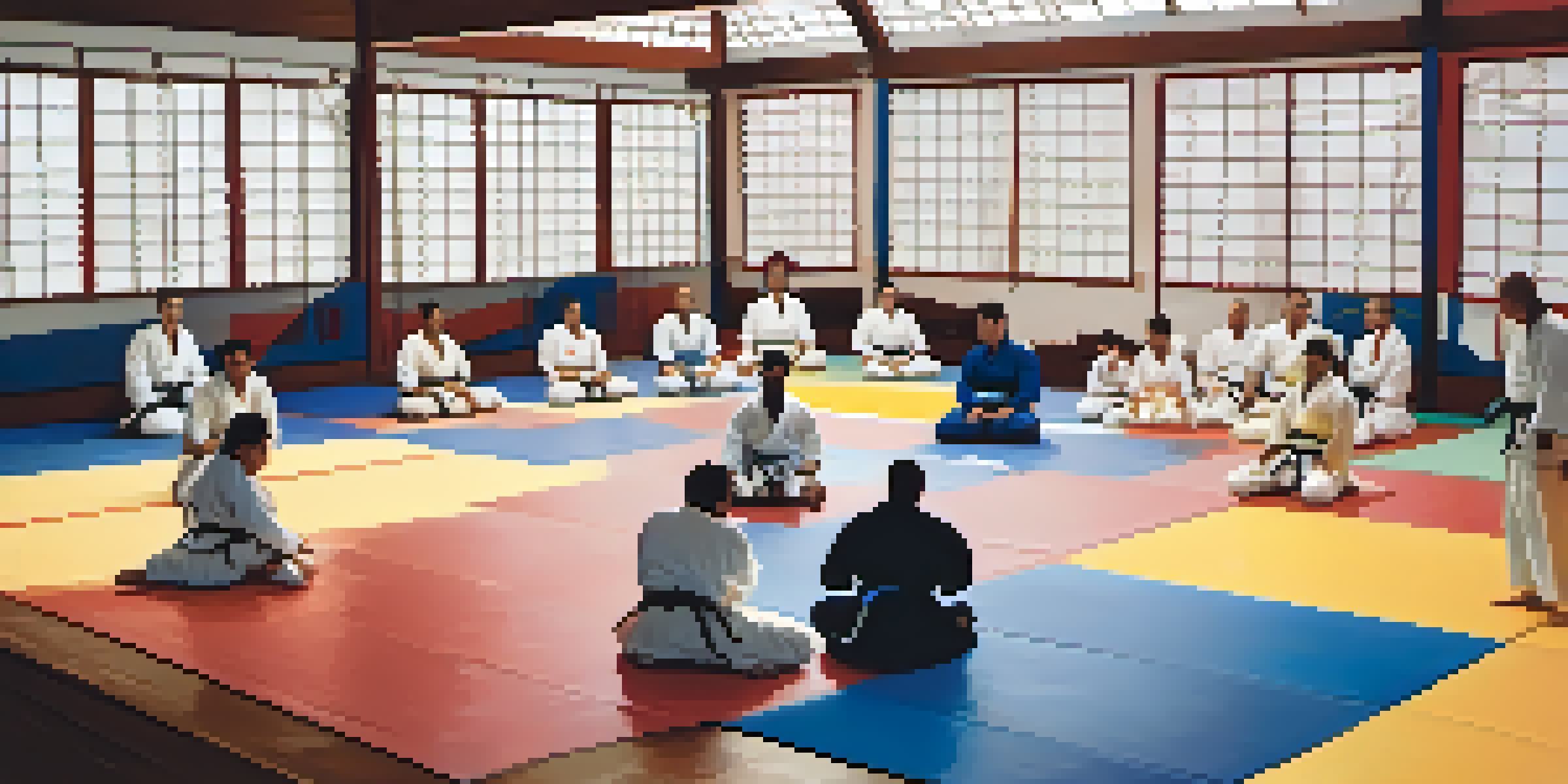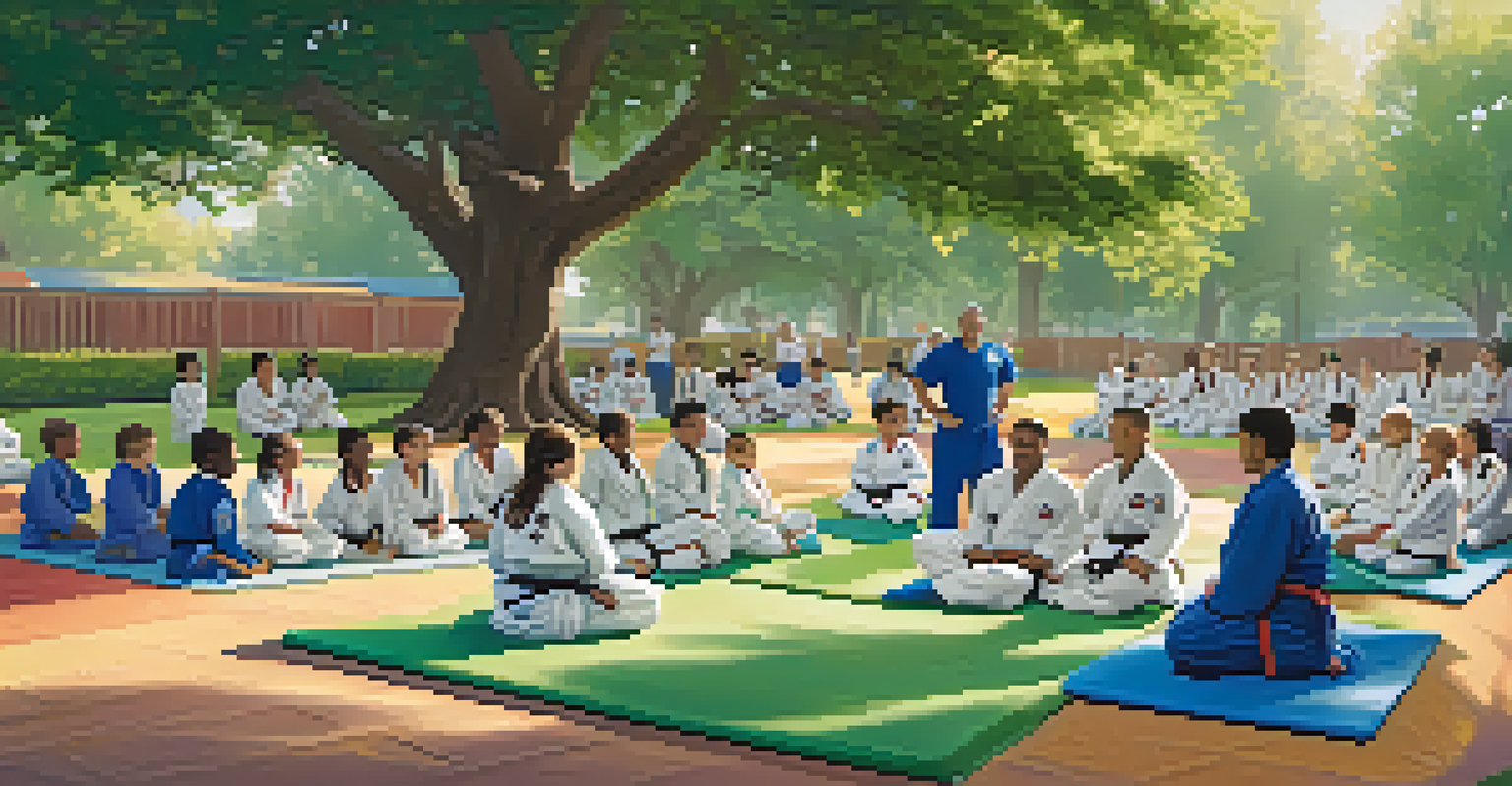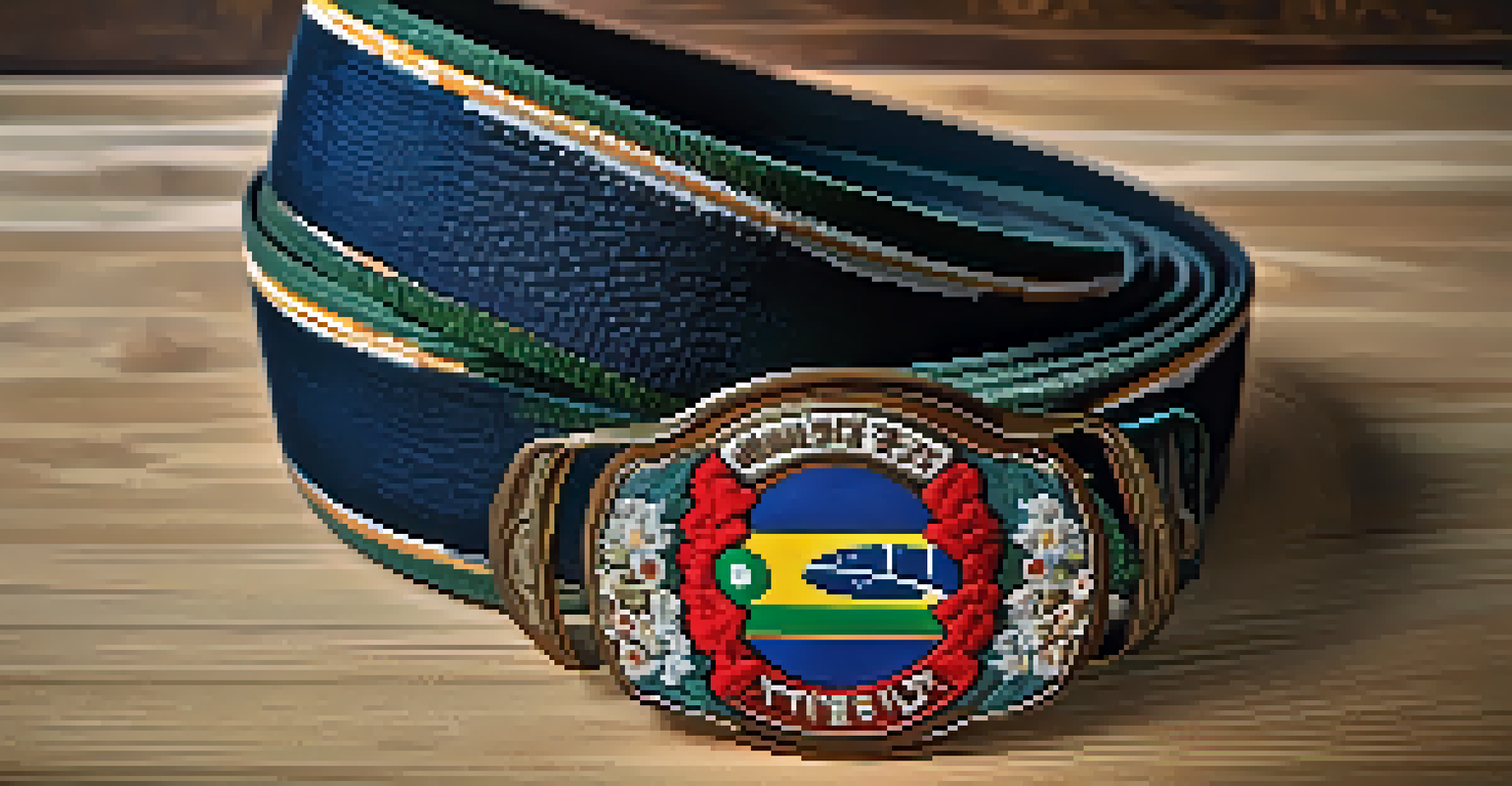The Influence of Jiu-Jitsu on Brazilian Sports and Identity

The Origins of Jiu-Jitsu in Brazil
Jiu-Jitsu's roots trace back to Japan, but it truly blossomed in Brazil. When Mitsuyo Maeda, a Japanese martial artist, arrived in Brazil in the early 20th century, he began teaching the art to locals. This introduction laid the foundation for what would become Brazilian Jiu-Jitsu (BJJ), a unique adaptation that emphasized leverage and technique over brute strength. As it evolved, BJJ became a symbol of Brazilian culture, intertwining with the nation's identity.
Jiu-Jitsu is not just about the fight; it's about the journey and the lessons learned along the way.
The early practitioners, including the Gracie family, played a pivotal role in developing the sport, promoting its effectiveness in self-defense and competition. Their dedication to refining techniques and teaching others helped BJJ gain immense popularity across Brazil. This grassroots movement not only attracted athletes but also became a way for people to connect, fostering a sense of community and pride.
Today, Jiu-Jitsu is more than just a martial art in Brazil; it's a cultural phenomenon that represents resilience and creativity. The evolution from its Japanese origins to a distinctly Brazilian form showcases the adaptability of the sport, highlighting Brazil's rich cultural tapestry. This transformation set the stage for Jiu-Jitsu's influence on sports and identity in the country.
Jiu-Jitsu as a Tool for Social Change
Beyond its competitive edge, Jiu-Jitsu has emerged as a powerful tool for social change in Brazil. Many grassroots programs use the martial art to engage at-risk youth, providing them with discipline, focus, and a sense of belonging. This approach not only promotes physical fitness but also instills important life skills, helping participants navigate challenges both on and off the mat.

In various communities, Jiu-Jitsu schools have become safe havens where individuals can escape negative influences. Instructors often serve as mentors, guiding students toward personal growth and empowerment. These programs illustrate how a sport can transcend its physical boundaries, fostering community and hope in areas where opportunities may be scarce.
Jiu-Jitsu's Cultural Impact in Brazil
Brazilian Jiu-Jitsu has evolved into a cultural phenomenon that reflects the nation's identity and resilience.
Moreover, these initiatives have garnered attention from media and sponsors, amplifying their reach and impact. As Jiu-Jitsu continues to thrive, its role in driving social change becomes increasingly evident, demonstrating the sport's potential to transform lives and uplift communities across Brazil.
The Rise of Brazilian Jiu-Jitsu Competitions
The competitive scene of Brazilian Jiu-Jitsu has exploded in recent years, drawing athletes from around the world. Tournaments like the World Jiu-Jitsu Championship and the Pan Jiu-Jitsu Championship have become prestigious events, showcasing the best talents in the sport. These competitions not only elevate the profile of BJJ but also contribute to Brazil's reputation as a powerhouse in martial arts.
The art of Jiu-Jitsu is a way of life that teaches us discipline, respect, and resilience.
Participation in these events fosters a sense of pride among Brazilian athletes, as they represent their country on the global stage. The camaraderie among competitors, regardless of nationality, further emphasizes the unifying aspect of the sport. Each match tells a story of dedication and resilience, reinforcing the notion that Jiu-Jitsu is about more than just winning.
Additionally, the growth of BJJ competitions has led to increased sponsorship opportunities and financial backing for athletes. This newfound support creates pathways for aspiring fighters to pursue their dreams, ensuring that the legacy of Jiu-Jitsu continues to thrive within Brazil's sporting landscape.
Jiu-Jitsu and Brazilian National Identity
Jiu-Jitsu has become an integral part of Brazil's national identity, often symbolizing the country's spirit of innovation and resilience. The sport reflects the Brazilian ethos of creativity, as practitioners constantly adapt techniques to suit their unique styles. This adaptability resonates deeply with the Brazilian people, who take pride in their ability to overcome challenges, whether in sport or everyday life.
Moreover, the global popularity of Jiu-Jitsu has positioned Brazil as a leader in martial arts. International practitioners often travel to Brazil to train, further solidifying its status as the birthplace of BJJ. This influx of global interest fosters cultural exchange, allowing Brazilians to share their traditions and values with the world.
Jiu-Jitsu as a Social Catalyst
Grassroots Jiu-Jitsu programs are empowering at-risk youth, fostering personal growth and community connection.
As Jiu-Jitsu continues to flourish, it serves as a reminder of Brazil's rich history and diverse culture. The sport encapsulates the nation's journey, showcasing how a martial art can influence both individual lives and the broader tapestry of national identity.
The Role of Jiu-Jitsu in Brazilian Education
In recent years, Jiu-Jitsu has found its way into the Brazilian education system, with schools incorporating the martial art into their curricula. This initiative promotes physical education and teaches valuable life skills, such as discipline, respect, and teamwork. Educators recognize that Jiu-Jitsu can enhance students' focus and confidence, contributing to their overall development.
By introducing Jiu-Jitsu at a young age, schools aim to instill a sense of community and belonging among students. The shared experience of training fosters friendships and mutual support, creating a positive school environment. This approach not only benefits the physical well-being of students but also nurtures their emotional and social growth.
Furthermore, integrating Jiu-Jitsu into education aligns with Brazil's broader cultural values, emphasizing the importance of physical activity and personal development. As more schools embrace this initiative, the positive impact of Jiu-Jitsu on the youth of Brazil becomes increasingly evident, shaping future generations both on and off the mat.
Jiu-Jitsu's Global Influence
The influence of Brazilian Jiu-Jitsu has transcended national borders, impacting the global martial arts community. With its effective techniques and emphasis on leverage, BJJ has gained popularity in various countries, attracting practitioners from different backgrounds. As more people embrace the art, they contribute to a diverse and inclusive global community centered around shared values.
International seminars, competitions, and training camps have further facilitated the spread of Jiu-Jitsu worldwide. This exchange of knowledge and techniques enriches the practice, allowing for continuous growth and innovation. As a result, practitioners are not only learning from Brazilian instructors but also sharing their own experiences, creating a rich tapestry of martial arts culture.
Global Reach of Brazilian Jiu-Jitsu
The international popularity of BJJ enhances Brazil's reputation as a leader in martial arts and cultural exchange.
The global appeal of Jiu-Jitsu also enhances Brazil's reputation as a leader in sports and culture. As the birthplace of BJJ, Brazil takes pride in its contributions to the martial arts world, reinforcing its identity as a nation of creativity and resilience. This international recognition serves to strengthen Brazil's cultural identity while promoting the values inherent in Jiu-Jitsu.
The Future of Jiu-Jitsu in Brazil
Looking ahead, the future of Jiu-Jitsu in Brazil appears bright, with continued growth and adaptation on the horizon. As the sport evolves, it will likely embrace technological advancements, enhancing training methods and accessibility for practitioners. Innovations such as online classes and virtual competitions could further democratize access to BJJ, reaching individuals in remote areas.
Moreover, the increasing interest in wellness and mental health may lead to a greater recognition of Jiu-Jitsu's benefits beyond physical fitness. As more people seek holistic approaches to well-being, the sport's emphasis on mindfulness and discipline may attract a broader audience. This shift could position Jiu-Jitsu not just as a martial art but also as a path to personal growth and self-discovery.

Ultimately, the future of Jiu-Jitsu in Brazil will be shaped by its ability to adapt and resonate with new generations. By staying true to its roots while embracing change, Jiu-Jitsu can continue to inspire and empower individuals, reinforcing its status as a vital part of Brazil's cultural identity and sports landscape.